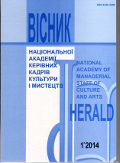ДО ПРОБЛЕМИ ВЗАЄМОДІЇ ТРАДИЦІЙ ТА ІННОВАЦІЙ У СУЧАСНІЙ КУЛЬТУРІ
DOI:
https://doi.org/10.32461/2226-3209.1.2014.137897Ключові слова:
традиції, інновації, культура, соціокультурні зміни, трансформаціяАнотація
У статті виявлено сутність та особливості взаємодії традицій та інновацій у сучасній культурі, зокрема розкрито джерела, механізми і спрямованість їхнього розвитку. Відзначено, що традиції та інновації сьогодні стають визначальними формотворчими чинниками трансформації і формування нової соціокультурної реальності. Наголошено, що традиції забезпечують стійке відтворення культурного досвіду, тоді як інновації – це механізми формування нових культурних моделей різного рівня, які створюють передумови для низки соціокультурних змін. Однак в епоху глобалізації інновації трансформуються в традицію безпрецедентно швидко, а тому не встигають набути якостей традиції, що призводить до неминучого конфлікту між традиціями й інноваціями і стиранню відмінностей між ними.
##submission.downloads##
Опубліковано
Номер
Розділ
Ліцензія
Автори, які публікуються у цьому журналі, погоджуються з наступними умовами:
1. Автори залишають за собою право на авторство своєї роботи та передають журналу право першої публікації цієї роботи на умовах ліцензії Creative Commons Attribution License International CC-BY, котра дозволяє іншим особам вільно розповсюджувати опубліковану роботу з обов'язковим посиланням на авторів оригінальної роботи та першу публікацію роботи у цьому журналі.
2. Автори мають право укладати самостійні додаткові угоди щодо неексклюзивного розповсюдження роботи у тому вигляді, в якому вона була опублікована цим журналом (наприклад, розміщувати роботу в електронному сховищі установи або публікувати у складі монографії), за умови збереження посилання на першу публікацію роботи у цьому журналі.
3.Політика журналу дозволяє і заохочує розміщення авторами в мережі Інтернет (наприклад, у сховищах установ або на особистих веб-сайтах) рукопису роботи, як до подання цього рукопису до редакції, так і під час його редакційного опрацювання, оскільки це сприяє виникненню продуктивної наукової дискусії та позитивно позначається на оперативності та динаміці цитування опублікованої роботи.

